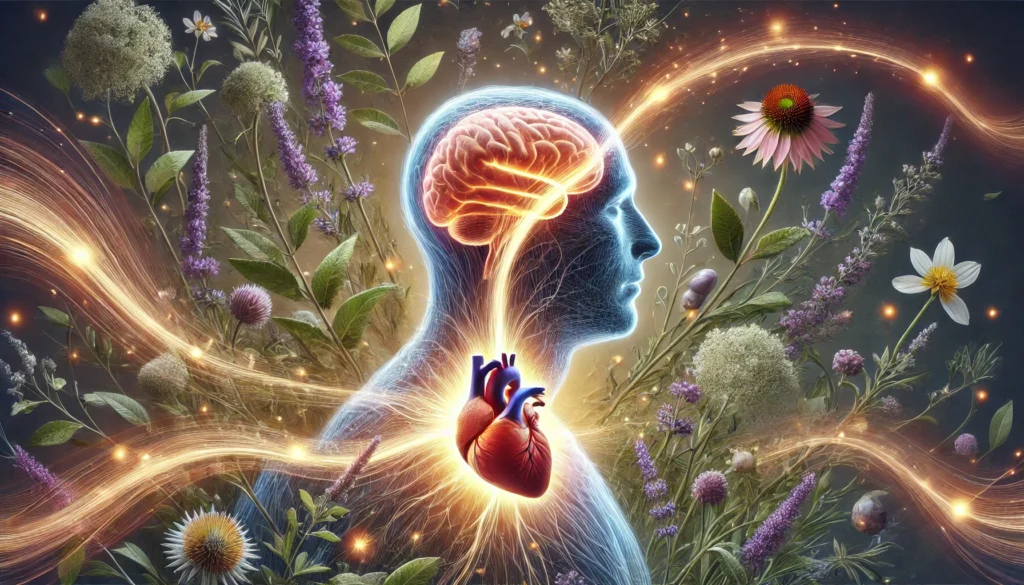In today’s high-stress environment, emotional stability is more than just a mental health goal—it is essential for overall wellness. As research in the field of integrative medicine continues to evolve, natural support strategies for mood regulation have garnered increasing attention. Among these, the use of vitamins for anger and irritability, along with herbal supplements to reduce stress, presents a compelling path for those seeking non-pharmaceutical options for emotional resilience. This article explores evidence-based approaches that harness the power of nature to support emotional equilibrium through carefully selected nutrients and adaptogenic herbs.
You may also like: The Best Herbal Supplements and Natural Pills for Focus, Energy, and Everyday Wellness

Understanding the Biological Roots of Irritability and Anger
Anger and irritability are not merely psychological states; they often stem from imbalances in neurochemistry and hormonal fluctuations. Chronic stress can elevate cortisol levels and disrupt serotonin, dopamine, and GABA—three neurotransmitters essential for mood regulation. These biochemical imbalances may manifest as emotional reactivity, mental fatigue, and difficulty coping with everyday stressors. By restoring balance through targeted nutritional support, individuals can often experience a noticeable improvement in emotional regulation. Identifying the underlying physiological contributors is a foundational step toward effective intervention, and it underscores why vitamins for anger and irritability can play a crucial role in holistic mood management.

The Role of B Vitamins in Mood Regulation
Among the most researched vitamins for anger and irritability are the B-complex vitamins, particularly B6, B9 (folate), and B12. These nutrients are vital for the synthesis of serotonin and dopamine, the brain’s key mood-related neurotransmitters. Low levels of B vitamins have been associated with increased irritability, anxiety, and even depressive symptoms. Supplementing with a high-quality B-complex can be especially helpful for those experiencing mood swings or emotional volatility. Furthermore, vitamin B6 assists in the conversion of tryptophan into serotonin, making it a linchpin in natural mood support. Regular intake of these vitamins through diet or supplementation may promote emotional resilience and help curb reactive behaviors rooted in neurochemical instability.

Magnesium and Its Calming Effects on the Nervous System
Magnesium is another powerhouse nutrient when it comes to calming the nervous system. Known for its role in muscle relaxation and stress response, magnesium also modulates the activity of the HPA (hypothalamic-pituitary-adrenal) axis, which governs the body’s reaction to stress. Deficiencies in magnesium are linked to increased agitation, restlessness, and emotional outbursts. In the context of vitamins for anger and irritability, magnesium acts as a mineral buffer against stress-induced excitability. By increasing GABA activity—a neurotransmitter responsible for calming the brain—magnesium helps reduce reactivity and enhances a sense of inner calm. Whether taken through leafy greens, nuts, or magnesium glycinate supplements, its impact on mood can be profound.
Vitamin D and the Light-Mood Connection
Vitamin D’s connection to mood is well-established, especially among individuals experiencing Seasonal Affective Disorder (SAD) or living in northern climates with limited sun exposure. As a fat-soluble vitamin that functions like a hormone, vitamin D helps regulate the expression of genes that influence neurotransmitter production. Low vitamin D levels have been correlated with increased aggression, depression, and irritability. Supplementing with vitamin D may offer measurable improvements for those struggling with mood dysregulation. This makes it a key component among vitamins for anger and irritability, especially during the darker months of the year or in individuals with known deficiency. Monitoring serum vitamin D levels can help tailor supplementation strategies for optimal emotional outcomes.
Herbal Adaptogens as Supplements to Reduce Anger
Adaptogenic herbs have long been valued in traditional medicine systems for their ability to stabilize mood and modulate the stress response. These natural botanicals support the body’s resilience to physical and emotional challenges by balancing cortisol levels and enhancing mental clarity. Among the most effective supplements to reduce anger, Ashwagandha, Rhodiola rosea, and Holy Basil (Tulsi) stand out for their neuroprotective and anti-inflammatory properties. Ashwagandha, for example, has been shown to lower cortisol and reduce anxiety in clinical trials, making it an ideal choice for those prone to emotional outbursts. Rhodiola helps regulate the nervous system by reducing fatigue and improving adaptability, while Tulsi fosters a calm, grounded state that counters irritability. Incorporating these adaptogens into daily wellness routines can be a transformative step toward emotional balance.
L-Theanine and the Promotion of Calm Focus
Derived from green tea, L-theanine is a non-sedative amino acid known for inducing a state of relaxed alertness. It stimulates alpha brain waves, which are associated with calm and creativity, without causing drowsiness. As part of a broader regimen of supplements to reduce anger, L-theanine offers a unique advantage: it enhances focus while simultaneously reducing mental tension. This makes it particularly valuable for individuals who experience irritability as a byproduct of cognitive overload or attention fatigue. In combination with caffeine, L-theanine has also been shown to improve attention span and reduce the jitters typically associated with stimulants. Its ability to promote mental clarity and emotional steadiness makes it an elegant solution for modern stressors.
Omega-3 Fatty Acids and Neuroinflammation
The connection between inflammation and mood disorders is gaining traction in scientific research, and omega-3 fatty acids play a pivotal role in this domain. Found abundantly in fish oil and flaxseed, omega-3s help reduce neuroinflammation and support brain cell membrane integrity. These effects translate into improved neurotransmitter function and emotional stability. For individuals seeking vitamins for anger and irritability, omega-3 supplementation offers a compelling, evidence-backed intervention. Studies have shown that individuals with mood disorders often exhibit lower levels of EPA and DHA, the two primary omega-3s associated with brain health. Increasing omega-3 intake through diet or supplementation may reduce aggression and enhance emotional control.
Synergistic Formulations: Combining Vitamins and Herbs
The interplay between vitamins and herbs can often amplify their individual effects, creating a synergistic impact on emotional well-being. For instance, combining B-complex vitamins with adaptogens like Rhodiola or Ashwagandha can support both neurochemical balance and hormonal resilience. Similarly, a formulation that includes magnesium, L-theanine, and Holy Basil can offer immediate stress relief while promoting long-term emotional regulation. When selecting supplements to reduce anger, it is beneficial to consider combinations that address both the neurological and physiological aspects of mood imbalance. Such integrative approaches align with the principles of holistic health and allow for more personalized, effective outcomes.
Personalized Supplementation and Professional Guidance
Although the landscape of natural mood support is rich with options, it is essential to recognize that no single remedy fits all. Biochemical individuality plays a significant role in determining how one responds to vitamins for anger and irritability or herbal supplements to reduce stress. Functional lab testing, nutritional assessments, and consultations with licensed healthcare professionals can help tailor supplementation to individual needs. Working with a naturopathic doctor, integrative physician, or registered dietitian ensures that strategies are safe, evidence-based, and synergistic with other health interventions. Personalized plans not only maximize effectiveness but also reduce the risk of nutrient interactions or over-supplementation.
Frequently Asked Questions (FAQ) on Natural Approaches to Anger and Irritability
What are some lesser-known vitamins for anger and irritability?
While magnesium and B-complex vitamins are commonly discussed, lesser-known nutrients like vitamin B5 (pantothenic acid) and vitamin K2 may also play a role in mood regulation. These vitamins support adrenal function and inflammation modulation, which are critical during emotional stress. When seeking vitamins for anger and irritability, it’s important to consider synergistic combinations that target both neurotransmitter production and stress response. For example, pairing B5 with vitamin C enhances adrenal health, potentially reducing the severity of outbursts. Supplements to reduce anger that include these vitamins are now being explored in clinical pilot studies.
How can adaptogens enhance the effects of supplements to reduce anger?
Adaptogens like rhodiola, ashwagandha, and holy basil support the body’s stress response system, helping regulate cortisol and nervous system reactivity. When taken alongside targeted vitamins for anger and irritability, adaptogens can enhance emotional resilience and buffer against chronic stress. This synergy provides a more comprehensive approach than single-agent supplements to reduce anger. New research also suggests that adaptogens modulate HPA axis function, offering benefits for people prone to mood swings. Personalized adaptogen protocols may soon become standard in holistic mood support.
Are there gender-specific differences in how people respond to vitamins for anger and irritability?
Yes, hormonal fluctuations in women, especially during PMS or menopause, can impact how certain vitamins and minerals function. For example, calcium and vitamin D3 seem to have a stronger calming effect in women, while zinc and L-theanine may be more effective in men. Customizing supplements to reduce anger based on sex hormones may be a promising area of future research. Additionally, combining these vitamins with lifestyle adjustments such as diet and sleep optimization can increase their effectiveness. Tailored supplementation could bridge the gap between general mood support and targeted emotional regulation.
Can vitamins for anger and irritability help manage stress-induced physical symptoms?
Absolutely. Nutrients like magnesium and vitamin B6 not only support neurotransmitter balance but also reduce physical symptoms such as muscle tension, fatigue, and headaches. Supplements to reduce anger often include these dual-action nutrients for this reason. For those experiencing chronic stress, addressing both emotional and physical symptoms simultaneously leads to more lasting relief. This is particularly useful for individuals whose anger is triggered by somatic discomfort or sensory overload.
How long do supplements to reduce anger typically take to show results?
Most people begin to notice improvements within two to four weeks of consistent use, especially when taking vitamins for anger and irritability as part of a broader wellness routine. However, the timeline can vary based on nutrient deficiencies, baseline stress levels, and individual metabolism. For some, immediate calming effects are observed with amino acid-based supplements, while for others, cumulative benefits unfold over time. Consistency is key—irregular use often leads to suboptimal outcomes. It’s also advised to track mood changes in a journal to gauge effectiveness.
Do certain supplements to reduce anger interact with medications?
Yes, especially those that influence neurotransmitters or blood pressure. For example, SAM-e and 5-HTP may not be advisable when taking SSRIs or MAOIs, as they could increase serotonin to unsafe levels. This makes it essential to consult a healthcare provider before starting any new supplements to reduce anger. Even vitamins for anger and irritability can influence drug metabolism through liver enzyme interactions. A pharmacist or integrative medicine doctor can help assess the safety of combining supplements with prescriptions.
How do gut health and microbiome diversity affect emotional regulation?
Emerging evidence links the gut-brain axis to emotional health, suggesting that probiotics and prebiotics can indirectly serve as supplements to reduce anger. Gut-friendly nutrients like L-glutamine, zinc carnosine, and fermented foods support both digestion and mood. Some strains of probiotics, such as Lactobacillus rhamnosus, have shown promise in lowering cortisol and stabilizing emotional reactivity. When combined with vitamins for anger and irritability, microbiome-enhancing interventions may amplify mental health benefits. Future protocols might include comprehensive gut testing alongside mood-focused supplementation.
Are there any lifestyle factors that boost the effectiveness of supplements to reduce anger?
Yes, supplements are most effective when paired with consistent sleep hygiene, regular physical activity, and mindfulness-based practices. Vitamins for anger and irritability work best when oxidative stress and inflammation are also minimized through diet and lifestyle. Even hydration levels and exposure to natural light can influence mood and supplement absorption. Holistic practitioners often recommend a multi-pronged approach that integrates mind-body habits. This synergy creates a sustainable foundation for emotional balance.
What are some early signs that your body needs more vitamins for anger and irritability?
Frequent mood swings, irritability without clear triggers, poor sleep quality, and heightened sensitivity to noise or frustration can all indicate underlying deficiencies. Cravings for sugar or salt and episodes of fatigue after stress also point to adrenal depletion or neurotransmitter imbalance. Recognizing these early signs allows for timely intervention with targeted supplements to reduce anger. Blood testing can help confirm suspected deficiencies, especially for B vitamins, magnesium, and vitamin D. Proactive care often prevents escalation to more severe emotional dysregulation.
Are there new developments in supplement formulations targeting emotional regulation?
Yes, recent advances in nootropic and adaptogen science are driving innovation in supplements to reduce anger. Some new formulas combine vitamins for anger and irritability with time-release delivery systems or nano-encapsulation for enhanced absorption. There is also growing interest in combining traditional botanicals with modern compounds like phosphatidylserine and L-theanine. These combinations aim to target both acute and long-term regulation of mood and irritability. As research deepens, we can expect more precision-targeted blends tailored to individual biochemistry and emotional patterns.
Conclusion: Restoring Emotional Balance Naturally with Science-Backed Support
Navigating the complexities of mood in a modern, overstimulated world requires more than willpower alone. Fortunately, science-backed natural interventions offer effective, accessible tools to restore inner equilibrium. From foundational vitamins for anger and irritability to powerful adaptogenic supplements to reduce anger and stress, a holistic approach to emotional wellness is within reach. By addressing the neurochemical, inflammatory, and hormonal underpinnings of emotional instability, these natural therapies empower individuals to feel more grounded, patient, and centered in daily life. As awareness continues to grow around integrative solutions, the synergy of nutrition and herbal medicine stands poised to redefine how we care for mental and emotional health in sustainable, empowering ways.
natural mood stabilizers, adaptogens for stress, serotonin support supplements, calming herbs for adults, mood balance naturally, integrative emotional health, non-prescription stress relief, anger management herbs, irritability and nutrient deficiencies, B-complex for mood, best supplements for anxiety and frustration, herbal remedies for nervous tension, amino acids and mental calm, stress relief through nutrition, plant-based anxiety relief, mind-body herbal support, magnesium for mood swings, inflammation and mood, mood-boosting adaptogens, nervous system support herbs
Further Reading:
The 10 Best Herbs to Boost Energy and Focus
7 Best Herbs for Memory and Brain Health
The 9 Best Supplements to Improve Brain Health: What the Science Says
The information contained in this article is provided for general informational purposes only and is not intended to serve as medical, legal, or professional advice. While NewsHealthWatch strives to present accurate, up-to-date, and reliable content, no warranty or guarantee, expressed or implied, is made regarding the completeness, accuracy, or adequacy of the information provided. Readers are strongly advised to seek the guidance of a qualified healthcare provider or other relevant professionals before acting on any information contained in this article. NewsHealthWatch, its authors, editors, and contributors expressly disclaim any liability for any damages, losses, or consequences arising directly or indirectly from the use, interpretation, or reliance on any information presented herein. The views and opinions expressed in this article are those of the author(s) and do not necessarily reflect the official policies or positions of NewsHealthWatch.

